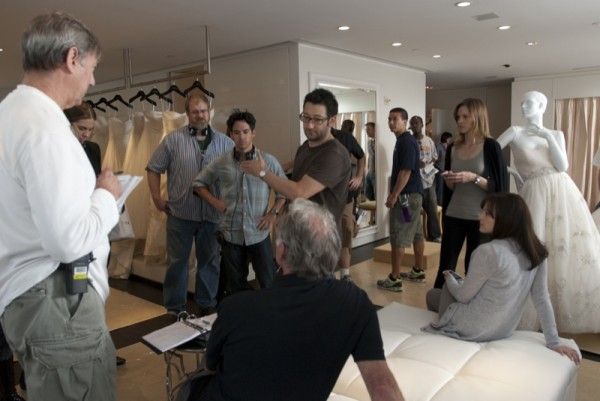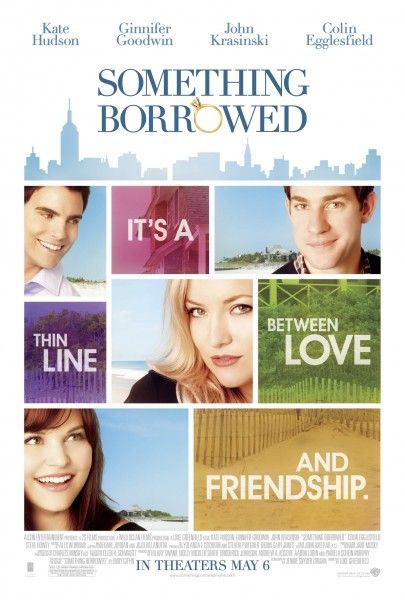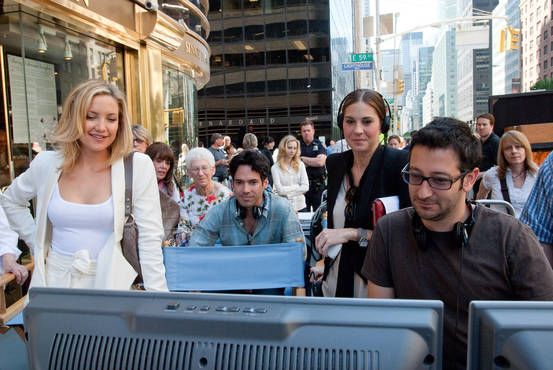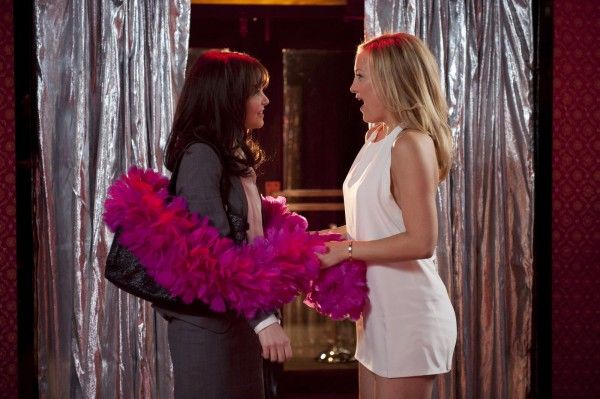When I first spoke to Hilary Swank, it was at the premiere of the Buffy the Vampire Slayer movie, in 1992. I spoke to her again in 1999, at the press day for Boys Don’t Cry, for which she went on to win her first Academy Award. A few press junkets and another Oscar later, I got to sit down with her and her producing partner, Molly Mickler Smith, on behalf of Something Borrowed, the first production under their company 2S Films, and was happy to learn that she was as friendly, genuine and gracious as she has always been.
During an exclusive interview with Collider at the film’s press day, Hilary Swank and Molly Mickler Smith, who have known each other for 13 years, talked about why they chose Something Borrowed for their first 2S Films production, the agonizing process of coming up with the perfect name for your company, assembling the right ensemble of actors to bring these characters to life, and showing how friendship can be complex and messy. They also talked about their current slate of projects in development. Check out what they had to say after the jump:
Here’s the synopsis:
In Something Borrowed, Rachel (Ginnifer Goodwin) is a talented attorney at a top New York law firm, a generous and loyal friend and, unhappily, still single as her engaged best friend Darcy (Kate Hudson) is constantly reminding her. But, after one drink too many at her 30th birthday party, perpetual good girl Rachel unexpectedly ends up in bed with Dex (Colin Egglesfield), the guy she’s had a crush on since law school, who also just happens to be Darcy’s fiancé. When Rachel and Darcy’s lifelong friendship collides with true love, it leads to unexpected complications and potentially explosive romantic revelations. Meanwhile, Ethan (John Krasinski), who has been Rachel’s constant confidante and sometimes conscience, has been harboring a secret of his own, and Marcus (Steve Howey), an irrepressible womanizer, can’t keep his mind out of the gutter or his hands off any girl within reach.
Question: How did this film come about for you, as the first 2S Films production?
MOLLY MICKLER SMITH: It was a book that my younger sister, Rachel, had given me, years ago, and I loved it. So, when Hilary and I formed our company and were building a slate of projects, I told her about the books and gave them to her. We just fell in love with it and went after the rights. It’s a really neat thing to be able to take something from the book, all the way to the screen. It was our first time doing that. Even when I got involved in P.S. I Love You, it was already in screenplay form.
HILARY SWANK: Yeah, I had already read it, and then you came on.
SMITH: So, this is our baby.
As producers, what is your involvement, through the whole process?
SWANK: We are literally involved with everything.
SMITH: We’re involved with every decision, from who’s going to adapt the book to the screenplay to a director to casting to wardrobe to music to editing to marketing. You never stop, which is great. When you’re the creative producers, as we were on this, you really get to see it from inception, all the way to the finished product.
Hilary, have you figured out what you’re going to do when you have projects in development while you’re doing acting roles, at the same time?
SWANK: That’s a good question. We’ve been doing this for three and a half years now. The development process of Something Borrowed was occurring during Amelia and Conviction, but the actual principal photography was being done when I had already wrapped those movies. For Molly, it means double duty because she may have to take more writing meetings and then narrow it down. And then, for me, on my weekends when I’m not filming, then I have to do all my homework on the people that it’s been narrowed down to. The good thing is that we both have our strengths that compliment each other, and it works really well.
SMITH: Neither of us ever stop working. On the weekends or at nights, we’re watching casting videos, or reading scripts and giving notes, and going back and forth and talking things out. We have a great working relationship.
Hilary, when you spend so much time on your own career to see what you can do, is it difficult to switch gears and start thinking about these things objectively to put the best person in the role?
SWANK: No. Obviously, this is my first movie under our 2S entity, but I’ve executive produced a lot of movies, which means I’ve cast a lot of movies. Not the roles that I was in, but with other people. It’s so great. I’ve been doing this for over half my life now, so you have a lot of people that you already believe in, that you want to bring on board to help us see our vision through. Ultimately, there is also a lot of new talent out there that you want to discover. What I love about making movies is that it’s a collaboration. It’s one of the most rewarding things, to create something and have someone show you something that you didn’t see, and vice versa. It’s that give-and-take and back-and-forth, that constantly allows you to grow as an artist and as a human being. For me, it’s a no-brainer to fall into this side of the business. We’re not producing things just as vehicles for me to act in. There are just so many stories that we want to tell that I couldn’t do it all.
SMITH: One of the benefits of having an actor-producer is that, when we look at casting times or we’re in the editing room together, she’s looking at it with a little bit of a different eye. She has comments on their performances and a take that is so incredible. She can say, “I really believed that.” It’s wonderful to have an actor come in and look at it from their eye. A lot of times, as a producer, you’re thinking about 20 other things, so it’s a great collaboration.
How did you guys initially decide to start working together?
SMITH: We’ve known each other for 13 years. I was a P.A. I came up the physical production track, and we had worked together on several movies.
SWANK: I literally watched her grow up in the business, and I’m continuing to watch her grow.
SMITH: Hilary is my seventh sister. I’ve got six sisters, and she’s my seventh.
SWANK: It’s been incredible. When you see that person, in the beginning, and you know they have something and they’re going to go far, and you watch them actually hit all those little marks and then big marks, it’s amazing. Her drive, passion and tenacity was obvious. She has great taste in material. We have the same work ethic.
SMITH: P.S. I Love You was really our bonding. That was the first movie I produced, as a creative producer, and Hilary was the star. It was an emotional experience, and we really bonded and grew together on that film.
Once you decided to form a company, how agonizing was it to come up with the perfect name?
SWANK: It took awhile. We went through a lot of different names, and a lot of names were taken. We came up with an idea for a name, but it was taken and we couldn’t use that.
SMITH: We couldn’t decide if we wanted some clever phrase or something we both liked. It was literally an agonizing task.
SWANK: It was!
SMITH: And then, someone wrote 2S on a piece of paper and it looked like two S’s that mirrored each other. I remember seeing the image and we were like, “That’s really simple. Why not? Let’s go for it!”
SWANK: You also don’t want to name your company something that doesn’t reflect your films. We’re young and we wanted it to be cool. There are so many things around deciding on a name.
Hilary, having been in the business as long as you have and having worked with so many different producers, were there things that you learned from those experiences, whether good or bad, that you wanted to be sure to apply to how you approach producing?
SWANK: Sure, there’s so many things. Andrew Kosove and Broderick Johnson run Alcon, and that’s where we have our first look deal. And, not only do they run Alcon, but they are a big part of helping us make decisions and we can run ideas by them. They’ve been really helpful.
SMITH: They’ve been producing mentors to both of us. They’ve produced several movies that Hilary starred in as well. They’re just really great, honest producers and we’ve chosen to try to follow in their image and operate a company with honesty and integrity, and work with really great people who are talented and collaborative.
SWANK: You’re always going to make mistakes. That’s life. You just want to grow from them and try to make as few as possible. That’s why you do reach out and ask people for help, where needed. It’s always a growing process.
What was it about these relationships that made them compelling enough to bring to the screen?
SMITH: We loved it because it’s something different. What I love about this is that the people who have seen it have said, “I can really relate to that,” or “I have a friend like Darcy,” or “I’m a Rachel and I let somebody walk all over me.” I just think that Emily really writes these real, flawed characters. Everyone in the movie – Dex, Ethan, Rachel and Darcy – are all growing up, and they’re all making some good choices and some bad. That’s part of growing up, and it’s refreshing to see that on screen, and see a group of friends that feels like your real group of friends and not a caricature or a movie cliche.
Did you have to make sure these characters were likeable, even though they’re doing some very unlikeable things?
SMITH: Yeah, definitely. To have these characters go on this journey, in the situation that’s going on in this movie, and be able to have empathy for them while this is going on, with both Rachel and Darcy, is a tricky balance and a very tricky meter. But, we loved that challenge of trying to get across the complex layers of their character flaws. In the novel, you have the benefit of being in Rachel’s head, so you’re in her inner thoughts and you’re rooting for her immediately because you are Rachel, reading that book. Adapting that for the screen was tricky because we didn’t want to do voice-over. We just wanted you to meet her and figure it out on your own, and form your own opinion. Same with Darcy. You meet someone like Darcy and it’s easy to say, “Oh, she’s shallow and self-involved,” but she’s really complex, and she’s actually vulnerable and insecure, and uses that as a defense mechanism. It’s an interesting character exploration that we got to do together, and it was a challenge.
Was it easy to assemble this cast of actors, and to find the right male counterparts for your two female leads?
SWANK: We knew immediately who we wanted to play Rachel and Darcy. We got our first choice. We were so lucky. Kate was like, “I don’t know if I want to do another romantic comedy,” before she even read it, and we were like, “Just read this. It’s different.” Being an actor myself, I know that you can be pigeonholed. I think Kate is a great dramatic actress, and I think she’s a comedic actress. I don’t think she gets as much opportunity to do drama as she does comedy, but I think she has the chops to do both. You can see, in this movie, that she’s emotional. It tugged at my heartstrings. It was nice that she got that opportunity to show that side of her again, with the little dramatic beats that were in there. I believe in talent, and you believe in who you cast and help them go the distance. So, we were really lucky with that. And then, Molly suggested John Krasinski, which was such an inspired idea. It’s a no-brainer. Once you see that face, that’s all you can picture.
SMITH: And, it’s a different role for John. He hasn’t gotten to do something like this, so I’m excited for people to see him in this. And then, for Dex, we knew we wanted to break someone fresh because we couldn’t think of anyone that lived up to Emily’s standards of Dex, the way she describes him in the book, as this JFK, Jr., perfect guy. We had two great casting directors who brought in a lot of really talented actors, but Colin [Egglesfield] was one of the first auditions we watched. We actually saw him on tape before meeting him in person, and he just blew us away.
SWANK: We just saw it. We were like, “That’s our Dex.”
SMITH: The cast feels fresh.
Hilary, did you ever think about being in the film yourself?
SWANK: Yes, in reading the book, I thought, “Is this going to be something that I’m going to want to be in?” We didn’t start a production company just for vehicles for me to act in. We just want to be able to tell great stories that we love and that move us. When the first draft of the screenplay came in, I just didn’t see myself in the role. That happens. I get offered scripts and I see somebody else in it, and that’s what happened here.
Which role would you have played, Darcy or Rachel?
SWANK: I don’t know, probably Rachel.
SMITH: Both girls are very complex, though, if you get under their character acrs, but probably Rachel.
Were you guys able to relate to the whole life crisis at 30 aspect of the film? Did you have those moments yourselves?
SWANK: Molly just turned 30 a couple weeks ago.
SMITH: Turning 30 is not that it’s that old, but the way I look at it is that it’s the first grown-up age that you turn where you feel like you need to start thinking about more grown-up choices in life. That’s what this movie is about. I’m not in my 20's anymore.
SWANK: And, you’re also not forgiven as easily for mistakes that you make. You’re held accountable. It’s like, “You know better. You’re not 20 anymore.”
SMITH: That’s right, and that’s what Rachel is faced with in this movie. She’s going, “I’m not where I want to be in my life, and I’ve actually never really asked myself what I want out of life. I’ve never spoken up for myself.” It’s not so much the age, as it is what is inspiring her to make a bold decision, come into her own and go after what she wants.
What made Luke Greenfield the right director for this?
SMITH: He was getting a reputation of being a more male-driven director because of Role Models, which he produced and developed, and Girl Next Door, which was edgy. But, Girl Next Door was a fantastic movie and we were both impressed by him and went after him. We called his agent and said, “Have him read this. This is really different, and he might have the right sensibility for it.” When we met him, we were blown away with his passion for this, hands down. He just had an incredible vision for this movie.
What do you think the message of this film is?
SWANK: Something that we definitely talked about is that friendship is complex and life is messy. We don’t tie it up in a nice bow and say, “Hey, look at that. That worked out exactly how I thought.” Every day, things are thrown at us that we didn’t expect to happen in that day. It’s all about the choices we make to deal with it. Do you choose to grow? Do you choose not to grow? Do you choose to stay stagnant, in that situation? Do you choose to stand up for yourself? What’s interesting about these two girls is that they’re very different, and they’re different from childhood, and a relationship can become stagnant. We’ve all had that opportunity in our lives where we say, “You know what? This relationship isn’t really healthy for me anymore. How am I going to deal with that? Do I choose to deal with it head-on, and we grow and continue our friendship? Or, did I get what I needed from that relationship and now it’s over?” In this movie, you get the opportunity to see Rachel stand up for herself because she’s always put everyone else first. She makes that choice to say, “Wait a minute! I need to stand up for me, this once.” And then, you see Darcy’s vulnerability. She put up this front because she’s actually insecure and scared. She has a moment where she brings it down and gets real. It really captures the two sides of that coin, in different personalities. It was really great to show both those types of characters for women to be able to relate to.
Are the actors signed on for the sequel, Something Blue?
SMITH: Yeah.
Hilary, many people felt that both you and Sam Rockwell deserved Oscar nominations for your performances in Conviction. Do you think you get pigeonholed because you’ve been there before?
SWANK: Sean Penn showed up at one of the screenings and he said to the audience, “Her looks are overrated and her talent is underrated because you just expect Hilary to do this. That’s what she does.” And, it was really a kind thing to say. That, to me, is winning an award. Having someone that you respect immensely say something about you is everything to me. That someone would talk about my work in that form is ultimately what matters. It’s an honor that people think that that’s easy. That’s the ultimate compliment, really.
And, you do have two Oscars already, right?
SWANK: And, there’s that. So, I have to say that I was really disappointed about Sam not getting nominated. I think Sam was due. I think his body of work really has spoken for itself. I think there are other times when people thought he was going to get nominated, and I think that this was the best that he’s ever done, so I was really bummed out. For me, I have two already, so I can’t complain. There’s nothing for me to complain about. But, I was really disappointed about Sam, and that was hard for me to work through. I really struggled with that.
Do you know what you’ll be focusing on next, for your production company? Do you have a plan for how much you want to take on, at one time?
SWANK: We’ll take on as much as we can. Ultimately, we believe in every project that we have going and whichever comes in first, through the development phase, is what we’ll make next. We have a few projects in development. We have a lot of books that we’ve adapted and we’ve found that we’re becoming the book company.
SMITH: It was not on purpose. It’s just that there’s a lot of great material out there in books.
SWANK: Yeah. There’s not a lot of original material out there, so when you find something original in a book, it’s a no-brainer.
SMITH: We try to diversify our slate, but really everything on it has a lot of heart and a lot of depth. Falling Out of Fashion is one of the books we have in development. That’s the fictional life story of Jane Pratt, the youngest magazine editor of all time. It’s really fun. We have a book called You’re Not You, by an author named Michelle Wildgen, that we’re producing with Denise DiNovi and developing as a drama. We’ve got Emily Giffin’s latest book, Heart of the Matter, in development. We’ve got several books, and we’re really excited about our slate.




